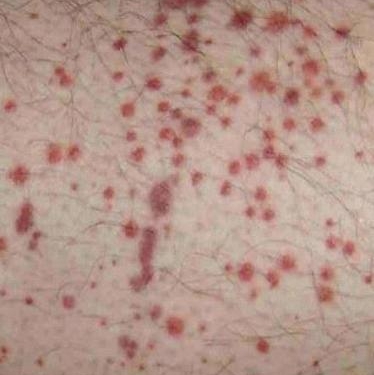Idiopathic Thrombocytopenic Purpura Symptoms, Causes, Diagnosis and Treatment

What Is Idiopathic Thrombocytopenic Purpura?
The disorder idiopathic thrombocytopenic purpura enables extreme or easy bleeding or bruising. Such bleeding tends to consequent due to considerable low levels of platelets. Platelets are the cells responsible for clotting our blood. Immune thrombocytopenic purpura is another name for idiopathic thrombocytopenic purpura. The disorder targets both adults and children. Often, children develop ITP after being affected by a viral infection. In most cases, they recover completely without needing any treatment. Though in adults, idiopathic thrombocytopenic purpura is chronic, in most instances.
Its treatment depends upon the age, platelet count and symptoms of the patient. In case the platelet count of the patient is normal and he or she experiences no obvious symptom of bleeding, then its treatment is not necessary. However serious cases of idiopathic thrombocytopenic purpura are treated by medications, whereas for critical situation, the doctor can suggest the option of surgery.
What Are The Symptoms Of Idiopathic Thrombocytopenic Purpura?
Usually, the disorder has no apparent symptoms, however when symptoms do tend to appear, they include:
- Fatigue.
- Excessive or easy bruising.
- Blood in stools or urine.
- Abnormally heavy flow of menstrual period.
- Bleeding gums.
- Impulsive bleeding from your nose.
- Excessive bleeding from minor cuts.
- Superficial bleeding into the skin.
What Causes Idiopathic Thrombocytopenic Purpura?
What exactly causes idiopathic thrombocytopenic purpura is still a mystery; however immune system of a person suffering from the disorder malfunctions. Consequently, it attacks against the useful platelets of the body.
What Are The Risk Factors Of Idiopathic Thrombocytopenic Purpura?
Any one among us, regardless of ages or races can develop idiopathic thrombocytopenic purpura, however, the below mentioned factors raises its risk:
- Women are more likely to develop idiopathic thrombocytopenic purpura as compared to men.
- A number of children with idiopathic thrombocytopenic purpura develop the particular disorder soon after some viral illness for example measles or mumps.
What Are The Potential Complications Of Idiopathic Thrombocytopenic Purpura?
Bleeding, especially intracranial hemorrhage –bleeding into your brain is the greatest risk linked with ITP.
How Is Idiopathic Thrombocytopenic Purpura Diagnosed?
In order to diagnose idiopathic thrombocytopenic purpura, the doctor will need complete medical history of the patient; furthermore, he or she can suggest the following:
- Complete blood count.
- Blood smear.
- Bone marrow examination.
- Physical exam.
How Is Idiopathic Thrombocytopenic Purpura Treated?
Its treatment aims to prevent the risks of bleeding complications, reducing the side effects of treatment and ensure a safe platelet count. In children, usually the disorder completes its course, needing no treatment at all. Whereas adults with mild form of idiopathic thrombocytopenic purpura only requires regular platelet checks and monitoring. However, in case the platelets count tends to remain low and the symptoms of the disorder are troublesome, the doctor can then prepare a treatment plan for you. Few treatment options of idiopathic thrombocytopenic purpura include:
1. Medications:
- Corticosteroids.
- Intravenous immune globulin.
- Thrombopoietin receptor agonists.
- Biologic therapy.
2. Splenectomy- removal of the spleen.
4. Immunosuppressant drugs.
Related Articles :
Ecthyma Symptoms, Causes, Diagnosis and Treatment
Diaper Dermatitis Symptoms, Causes, Diagnosis and Treatment
Chronic Lymphocytic Leukemia Symptoms, Causes, Diagnosis and Treatment
Bartonellosis Symptoms, Causes, Diagnosis and Treatment
Pruritus Symptoms, Causes, Diagnosis and Treatment
Measles Symptoms, Causes, Diagnosis and Treatment
Keratosis Pilaris Symptoms, Causes, Diagnosis and Treatment
Impetigo Symptoms, Causes, Diagnosis and Treatment
Ichthyosis Vulgaris Symptoms, Causes, Diagnosis and Treatment
Seborrheic Keratosis Symptoms, Causes, Diagnosis and Treatment
Scleroderma Symptoms, Causes, Diagnosis and Treatment
Porphyria Symptoms, Causes, Diagnosis and Treatment
Polycythemia Vera Symptoms, Causes, Diagnosis and Treatment
Hidradenitis Suppurativa Symptoms, Causes, Diagnosis and Treatment
Hyperhidrosis Symptoms, Causes, Diagnosis and Treatment
Lichen Planus Symptoms, Causes, Diagnosis and Treatment
By : Natural Health News




